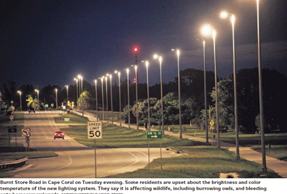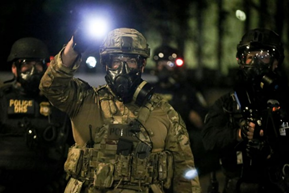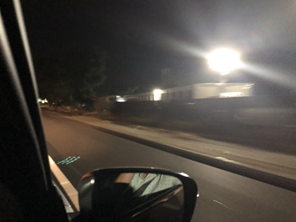BURNT STORE ROAD
Tom Howard lives in Lee County, Florida. In late 2019, the county installed 4000K LED streetlights along Burnt Store Road where he lives. Mr. Howard found the lights to be unbearably bright and the light trespassed in through the windows of his house. The county refused to make any changes to the lights, so Mr. Howard became a light pollution activist and has been working ever since to convince Lee County to fix the lights.
Mr. Howard built a website (https://www.bslighting.org/), an online petition (now with over 500 signatures) and paid for an engineering study to prove that the installed lights were the wrong type for the project. In addition, Mr. Howard compiled a report exceeding 100 pages that detailed his efforts to convince the

Lee County Department of Transportation to fix the issue, that provides the research studies as to why blue wavelength light at night is bad for our health and the engineering studies that show that the wrong type of lights were installed. Mr. Howard has submitted his report to the Lee County commission and is planning on making a presentation.
Soft Lights wrote to Amy Williams of the Fort-Myers News-Press in support of Mr. Howard’s efforts and we were quoted in her subsequent front-page news story. Read the story here: Burnt Store Road
PORTLAND LIGHT POLLUTION PROPOSAL
Portland, Oregon, and the Portland Audubon Society are working together on a light pollution proposal for the city. The initial proposal is welcome news in the effort to protect darkness. The proposal documented the many negative consequences of light pollution. The proposal also spelled out clearly that there is no link between bright lights and crime reduction.
The proposal recommends a maximum of 3000K for color temperature. For sensitive receptors, 3000K is still too high. Soft Lights submitted public comments that the maximum color temperature be set to 2700K. Also, the proposal lacked any discussion or recommendations to protect sensitive receptors, so we requested that the city revise their report to ensure that a substantial portion of the proposal discusses protections for sensitive receptors. A news story and link to the proposal can be found here: Dark Skies Portland
Light Pollution and Mental Disorders
A major new study was released this month showing that artificial light at night increases the risk of teenagers developing bipolar disorder and other mental illnesses. This study should be in the hands of all school districts and administrators should be making all possible effort to convince city councils to eliminate light pollution. Teachers well know the difficulty of
teaching to students with ADHD, bipolar disorder, anxiety, or depression and how difficult it is for the students to be focused in a classroom setting. Since artificial light is a contributing factor to degraded mental health, city councils have a duty to protect their students by eliminating the health risk.
An article and a link to the study can be found here: Sleep Study
July Advocacy
July 1: Peoria, Illinois – News Story – We wrote to the city council asking them to select 2200K to 2700K for their new LED streetlights. Email: dmoore@peoriagov.org
July 1: Pasco County, Florida – News Story – After reading the story about an accident and following request to install brighter lights on the roadway, we wrote the commissioners to let them know that brighter, higher color temperature lights will have more glare, will harm driver’s eyes and may cause more accidents, not less. Email: mikemoore@pascocountyfl.net
July 1: Sacramento Fire Department – Video – Upon being overwhelmed by high intensity strobe lights from fire trucks and ambulances, we wrote to ask for the elimination of strobing LED lights.
July 8: Williamstown, Massachusetts – News Story – The council is looking into installing LED lights, so we sent them our educational materials. Email: selectboard@williamstownma.gov
July 10: Provo, Utah – News Story – The council currently allows electronic billboards, but is debating the churn time on the advertisements. We wrote the council to inform them that electronic advertising billboards violate the 14th amendment right to liberty, are a distraction, waste energy and provide no positive societal benefit. Email: bfillmore@provo.org
July 11: Roseville, California – News Story – A new study shows that artificial light at night can cause teenagers to develop bipolar disorder or specific phobias. We wrote the city council and the school district to urge them to work together to eliminate the light pollution. Email: afong@rcsdk8.org
July 16: Placer County Planning Department – Video – A radio tower has a high intensity Xenon strobe light that is mentally torturous for sensitive receptors and dangerous for drivers on the ground. We wrote the planning department asking for help in eliminating these strobe lights. Email: planning@placer.ca.gov
July 17: American Automobile Association – News Story – We wrote AAA to ask them why they are not taking a position on dangerous high color temperature LED and HID headlights. Email:
eedmonds@national.aaa.com
July 19: Oneonta, New York – News Story – We wrote to the council to provide them educational information about lights and we recommended that all lights be 2700K or less, shielded and diffused. Email: lmurphy@oneonta.ny.us
July 19: Tadley, Hampshire, England – News Story – The council had approved outdoor sports lighting, so we wrote to provide information about bats and light trespass. Email: clerk@tadleytowncouncil.gov.uk
July 21: Cromwell, Connecticut – News Story – A council member wrote an op-ed against electronic billboards. We wrote the council in support of banning electronic billboards. Email: Jdemetriades@cromwellct.com
July 21: American Civil Liberties Union, Oregon – Video of the protests in Portland showed many instances of LED and laser lights being used as weapons. We wrote the ACLU to ask for legislative action or lawsuits to ban such light weapons. Email: info@aclu-or.org

July 21: Sacramento, California – We took photos of a high color temperature light that shines from a mini storage facility directly into the eyes of drivers traveling more than 60 miles per hour and asked the city why they allow such a dangerous condition. Email:
clerk@cityofsacramento.org

July 22: Costa Rica – News Story – Costa Rica is moving towards a carbon-free and plastic-free society. We wrote them to support their efforts and to ask that they also eliminate light pollution. Email: cmrodriguez@minae.go.cr
July 26: Merrymeeting Bay, Maine – News Story – The Friends of Merrymeeting Bay have initiated a lawsuit against Central Maine Power due to their use of high energy Xenon strobe lights and their plan to replace the strobe lights with powerful radar that may damage human cells and wildlife. We wrote in their support and filed an Americans with Disabilities Act request for accommodation with Central Maine Power. Email: fomb@comcast.net
July 29: Portland, Oregon – News Story – We wrote to the city in support of their efforts to create light pollution regulations, but the proposal was advocating for 3000K. We recommended 2700K to be the maximum and that 2700K be used only in a small set of downtown business locations. We also requested that the proposal ensure that the light sensitive receptors be protected. Email: darkskies@portlandoregon.gov
July 30: Disability Rights, California – There are so many utility trucks and police cars in Sacramento using high energy LED strobe lights that it is impossible to navigate the city as a sensitive receptor without being overwhelmed by the strobe lights. We wrote to the Disability Rights group to ask for help in having the city comply with the federal Americans with Disabilities Act and help with eliminating the strobe lights. Email: Christian.Lopez@disabilityrightsca.org